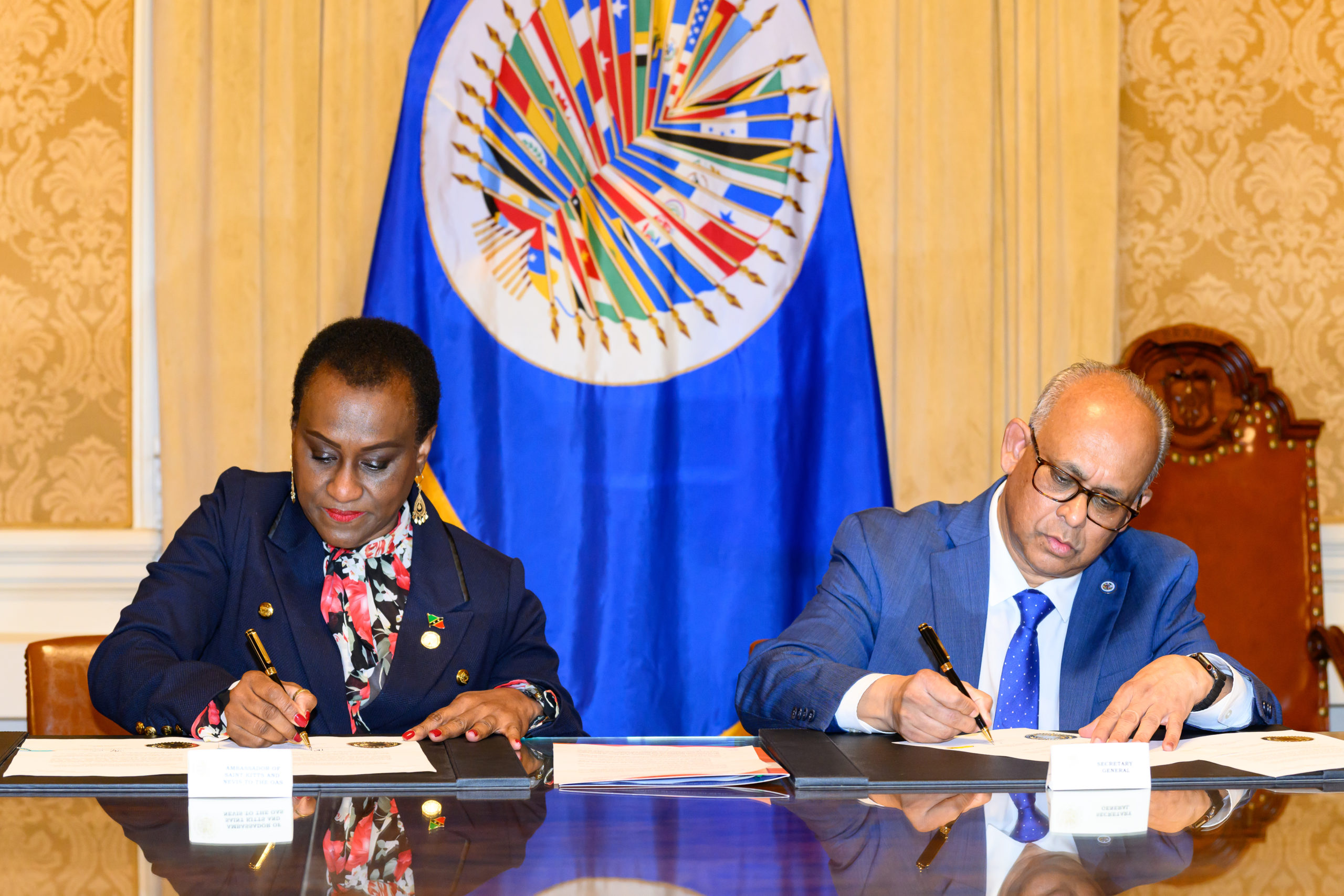Washington D.C., May 29, 2025 – Saint Kitts and Nevis has formally deposited its instruments of accession at the Organization of American States (OAS), affirming the Federation’s commitment to advancing human rights protections. The accession covers two major Inter-American conventions: the Inter-American Convention on the Elimination of All Forms of Discrimination against Persons with Disabilities (CIADDIS) and the Inter-American Convention on Protecting the Human Rights of Older Persons.
The official ceremony, held at OAS headquarters, marked a significant milestone in the Federation’s human rights journey. Permanent Representative of Saint Kitts and Nevis, Ambassador Jacinth Henry-Martin, underscored the importance of this step, emphasizing her country’s dedication to inclusion and dignity for all.
“Saint Kitts and Nevis is making history” with the accession of these two instruments, as it “reaffirms its unwavering commitment to the principles enshrined” in them, she said.
“Our nation, though modest in size, harbors a boundless ambition to ensure that every citizen, regardless of age or ability, is afforded dignity, respect, and equal opportunity. This vision is not merely aspirational; it is the cornerstone of our policies and initiatives,” Ambassador Henry-Martin stated.

Place: Washington, DC
Credit: Juan Manuel Herrera/OAS
OAS Secretary General Albert Ramdin welcomed the action taken by Saint Kitts and Nevis, emphasizing the importance of collaboration and shared experiences across the region.
“We need to promote more cooperation among member states to share best practices and experiences on how to treat persons with disabilities and make progress in the scientific and technological search for treatment, as well as participation of people with disabilities themselves in the preparation, implementation and evaluation of measures,” said Secretary General Ramdin.
Regarding the Convention on the Rights of Older Persons, Ramdin added, “We should not forget that persons coming at that age have served the nation, the country for many, many decades before, and they deserve, in whatever capacity they had engaged in society, to be treated well.”
Ambassador Henry-Martin also highlighted the Federation’s ongoing efforts to align national frameworks with the principles of the Conventions.
“Recognizing the unique challenges faced by persons with disabilities, our government has embarked on a comprehensive review of the 2017 Disabilities Policy, which, although not formally approved, is being updated with technical assistance from the United Nations Economic Commission for Latin America and the Caribbean (UNECLAC). A new Disabilities Bill is being drafted, with both the policy and legislation expected to be completed by December of this year,” she stated.
She further noted significant collaborations between the Ministry of Aging and Disabilities, the Skills Training Empowerment Programme (STEP), the St. Kitts Nevis Association of Persons with Disabilities, Ade’s Place, Nevis Community-Based Rehabilitation (CBR), and the Ministry of Social Development. These partnerships have created training and job placement opportunities for persons with disabilities.
One of the major highlights was the implementation of the thriving Seniors’ Day Programme by the Ministry of Aging and Disabilities, which now serves six communities across the Federation. As Ambassador Henry-Martin noted, the programme is “fostering social engagement, physical well-being, and lifelong learning. The mobility bus recently gifted to us will also serve persons with disabilities, ensuring accessible transportation for all.”
With the accession, Saint Kitts and Nevis joins the growing regional movement to eliminate discrimination and promote equal rights for older persons and persons with disabilities.
The Inter-American Convention on Protecting the Human Rights of Older Persons was adopted by the OAS General Assembly in 2015 and entered into force in 2017. It has been ratified by Argentina, Belize, Bolivia, Chile, Colombia, Costa Rica, Ecuador, El Salvador, Mexico, Peru, Suriname, and Uruguay.
The CIADDIS was adopted in 1999 and entered into force in 2001. It has been ratified by Argentina, Bolivia, Brazil, Chile, Colombia, Costa Rica, Ecuador, El Salvador, Guatemala, Haiti, Honduras, Mexico, Nicaragua, Panama, Paraguay, Peru, the Dominican Republic, Uruguay, and Venezuela.
-End-
